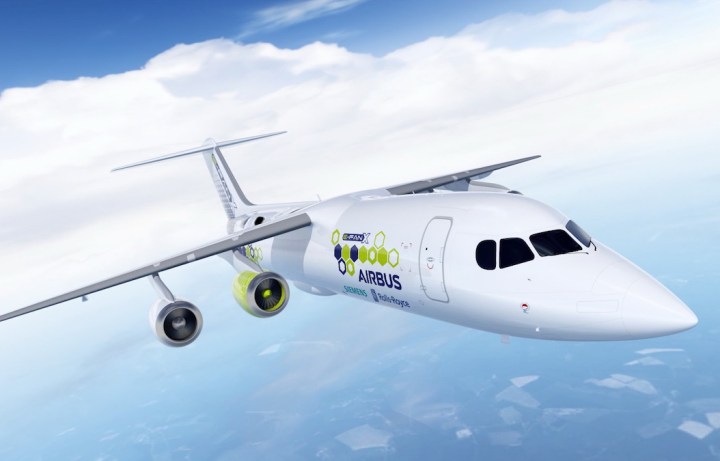
The ambitious plan isn’t the work of some obscure company you’ve never heard of, either. Instead, it’s the goal of big-name firms Airbus and Siemens. And now Rolls-Royce is joining the collaborative effort.
The trio are confident that its hybrid-electric plane can transform the short-haul market, with the first demonstration aircraft taking to the skies as early as 2020. A commercial service using planes with up to 100 seats could potentially come just five years after that.
The race is on to build an airplane that’s kinder to the environment, and a design like this would help to markedly reduce both air and noise pollution compared to today’s jet planes.
The E-Fan X program, as it’s called, will start out by placing a 2-megawatt electric motors alongside three jet engines on a BAe 146 aircraft, Airbus said in a release this week. Once sufficient progress has been made, a second electric motor will replace another of the jet engines. Fully electric planes are a challenge too far with the current technology because of the heavy weight of existing batteries.

The test aircraft aims to explore the challenges of high-power propulsion systems, “such as thermal effects, electric thrust management, altitude and dynamic effects on electric systems, and electromagnetic compatibility issues.” At the same time, the project will help to train a new generation of designers and engineers “to bring hybrid-electric commercial aircraft one step closer to reality,” the plane manufacturer said.
Airbus has been working with Siemens for several years on developing alternative methods of powering passenger planes, but the latest move to bring Rolls-Royce on board brings new skills and experience to the joint effort.
The three companies will use their respective areas of expertise to push the plan forward. Airbus will take care of the control integration of the hybrid-electric propulsion system and batteries and its integration with the flight controls, while Rolls-Royce will be responsible for the turbo-shaft engine, two megawatt generator, and power electronics. Siemens, meanwhile, will focus on the electric motors and their power electronic control unit, among other technical challenges.
“The E-Fan X is an important next step in our goal of making electric flight a reality in the foreseeable future,” said Airbus chief technology officer Paul Eremenko.
He added: “The lessons we learned from a long history of electric flight demonstrators … will pave the way to a hybrid single-aisle commercial aircraft that is safe, efficient, and cost-effective. We see hybrid-electric propulsion as a compelling technology for the future of aviation.”
Industry giants like these are in an excellent position to offer huge resources for the ambitious project, and hopefully the team can stay on track with its development plans for an exciting new aircraft capable of reducing not only air pollution, but also noise for those living close to flight paths.


